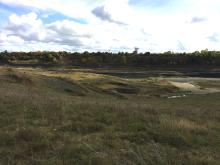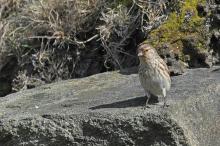Two Exmoor ponies, Patience and Ryburn, are now residents at
Branton, a former sand and gravel quarry, has been progressively restored and transformed into a stunning 29 hectare nature conservation area and the introduction of Patience and Ryburn will enhance the wildlife on the site through conservation grazing.
Conservation grazing is the use of grazing animals to manage sites of conservation interest. The two Exmoor ponies have been provided by Flexigraze, an innovative social enterprise run by Northumberland Wildlife Trust, which specialises in providing different species of breeds and livestock for grazing on nature reserves and important grasslands.
Extensive grazing at Branton will create a diverse sward (land covered with turf or grass) making it richer in plants, insects and invertebrates including butterflies and bumble bees and therefore of benefit to a variety of birds. It can also help ground-nesting birds such as lapwings, curlews, yellow wagtails and skylarks, by providing nesting cover.
“Patience and Ryburn are an excellent way of keeping the grass mown. But they do more than just ensuring the area doesn’t become overgrown, they help to increase the biodiversity of the site, which is to everyone’s benefit,” comments Stephen Comber, Flexigraze.
Conservation grazing at Branton contributes to Cemex’s Biodiversity Strategy which was launched in 2010 and aims to manage and enhance priority conservation habitats to create outstanding areas for people, communities and nature.”






